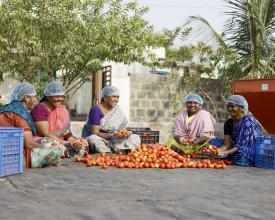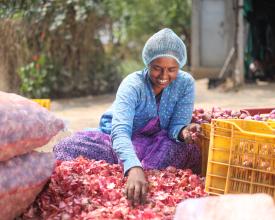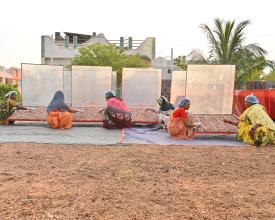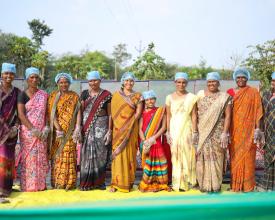
Using Solar Dryers for Value Addition and the Reduction of Post Harvest Loss
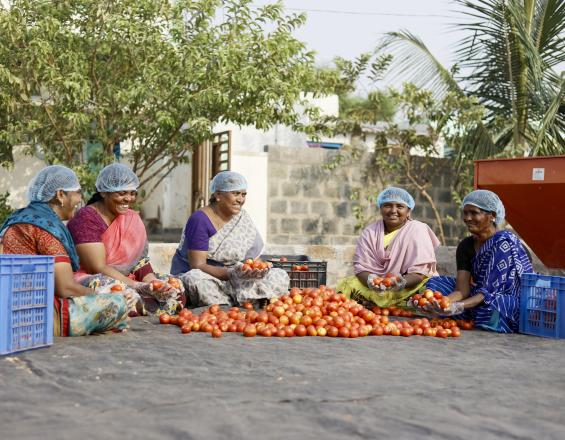
The perishability of agricultural products combined with high market volatility and limited infrastructure for handling fresh produce, pose serious challenges for smallholder farmers and result in high post-harvest losses. The Green Innovation Centre - India (GIC) and Science 4 Society (S4S) technologies piloted a women-led entrepreneurship model, tackling this and related challenges. The project enabled women to establish their own processing units centred around solar powered dryers and to integrate into the value chain. Based on the project’s success, in tackling food waste, creating additional employment, increasing rural incomes and enhancing women’s participation in agri-business, the model was extended to other value chains. First to onion and potato - crops, for which India is the world’s second-largest producer and which face some of the highest post-harvest losses. Later, the innovation was expanded to the apple value chain, which holds strategic importance for mountainous states like Himachal Pradesh.
Context
Challenges addressed
Environmental challenges
Post-harvest losses of up to 40% in tomato and potato value chains represent not only lost income opportunities, but wasted natural resources such as land, water and energy. Decomposing food-waste in landfills contributes to methane and carbon dioxide emissions, exacerbating climate impacts.
Social challenges
As men migrate to urban areas, women, many of whom landless, are increasingly taking on farming responsibilities, who make up 80% of all economically active women in India's rural areas. Their opportunities for income generation are severely restricted, but can be improved through access to programs designed to strengthen skills, infrastructure access and market integration.
Economic challenges
Over 80% of Indian farmers are smallholders with landholdings below two hectares, who are especially vulnerable to price volatility and climate-related shocks and face significant infrastructure gaps. The high degree of post-harvest losses and limited marketability of low graded produce undermine farm incomes.
Location
Process
Summary of the process
Women are initially trained with entreprenurial as well as technical skills for solar drying units. Access to the technology is enables through facilitating financial and institutional support. To develop a sustainable business model, forward linkages are established for value chain integration. Development of these successful entrepreneurs creates additional jobs along the value chain.
Building Blocks
Fostering Women Entrepreneurship - Through Household Solar Drying Units
Small-scale entrepreneurship in processing of agricultural produce is at the core of the solution. Under the GIC programme, women were supported to establish self-owned solar-powered dehydration units, in collaboration with S4S. S4S is a private social enterprise that developed the units. Each unit includes equipment such as pulverisers, sealers, and packaging tools, enabling decentralized, energy-efficient food processing.
To support the 2,500 women entrepreneurs in their operations they received training in areas including the use and maintenance of machinery, hygienic food processing, storage, and packaging. A second focus area was financial literacy, covering budgeting, bookkeeping, and accounts management, to enable the women to run their business well informed and responsibly. Furthermore, the women were introduced to the environmental benefits of the solar technology and reductions in food waste they are contributing to.
The project served as the basis for developing a structured, user-friendly training module which was refined throughout the implementation period. With this module in place, the approach can now be more easily scaled and replicated. The materials were translated into local languages such as Marathi and Telugu to ensure accessibility and are now being used by S4S Technologies in other projects.
Many of the women involved were previously engaged as landless farm labourers. The model offered a pathway to greater income stability and economic participation through ownership and value chain integration.
Enabling factors
- Capacity-building tailored to market-linked food processing and enterprise management
- Selection of value chains with high post-harvest losses (e.g., tomato, onion, potato, apple)
- Geographic clustering of women-led enterprises reduces logistical costs, and improves market access
Access to Finance and Institutional Support
Ownership allows for true economic independence of the women entrepreneurs. To enable this however, affordable access to credit is essential. The model mobilized credit from traditional financial institutions at low interest rates and facilitated convergence with government schemes, which together allowed for women to invest in solar-powered dehydration units and related equipment. With support from GIC, women entrepreneurs accessed the Pradhan Mantri Formalisation of Micro Food Processing Enterprises (PM-FME) scheme, which offered capital subsidies of up to 40% of the project cost. These financing mechanisms reduced entry barriers enough, to allow for ownership, and helped institutionalize women’s participation in the agricultural value chain. The accessed financing through traditional financial institutions amounted to 4 million Euros and supported the promotion of 2,500 women-led entrepreneurs who saw a significant increase in their income.
Value Chain Integration
The solution enables full integration of rural women entrepreneurs into the agricultural value chain. Through collaboration with the social enterprise S4S Technologies, the women entrepreneurs did not only receive processing equipment and training, but were linked to sources of raw materials, and were guaranteed buy-back of their produce through business-to-business agreements. The model also facilitateed value addition to lower-grade or surplus produce that would otherwise be wasted, allowing the generation of income from underutilized resources. S4S handles produce collection, quality control, secondary processing, and marketing, offering an ideal “one-stop solution” for business-to-business customers. This reduces market risk and logistical complexity for women entrepreneurs and ensures redistributed benefits across the value chain.
Enabling factors
- Collaboration with a private sector actor experienced in decentralized food processing and value chain coordination
- Guaranteed buy back agreements
- Centralization of aggregation, quality control, and secondary processing
- Focus on value addition to surplus and lower-grade produce
- Holistic model that redistributes value across stakeholders
Creation of Additional Jobs Along the Value Chain
The model does not only enhance income opportunities for the women entrepreneurs around whom it is centered, but also creates a variety of additional jobs with different qualification levels across the value chain. By addressing all steps from raw produce to the market, the intervention generates employment in transport, processing, logistics, equipment maintenance, and quality control. According to S4S Technologies, more than 200 jobs were created through the project in Maharashtra and Karnataka alone, including field executives, production supervisors, technicians, drivers, porters, machine operators, and factory staff. In addition, 14% of the surveyed women entrepreneurs reported having created at least one job at their solar drying unit.
Enabling factors
- End-to-end value chain involvement, from sourcing to secondary processing
- Operational and infrastructure needs arising from decentralized processing units
- Coordination through S4S Technologies to manage aggregation, maintenance, and logistics
Impacts
Environmental:
The solution contributes to climate mitigation by reducing post-harvest losses and greenhouse gas emissions. The project’s total contribution to annual greenhouse gas emissions reductions amounts to 80,000 tons of CO₂ across 100 villages.
Economic:
The model enabled 2,500 women-led enterprises, with plans to expand by 1,000 more. Average annual income rose from INR 55,908 to INR 1,13,812, while average working days decreased from 213 to 142. Women gained access to solar-powered units, markets, and finance, with €4 million leveraged from financial institutions. Annual processing capacity now reaches 375,000 tons.
Social:
The model strengthens women’s position within households and society by promoting economic independence, entrepreneurship, and ownership. Formerly landless or marginal women farmers now manage enterprises from their homes, enabling them to balance income generation with family responsibilities.
Beneficiaries
Women in rural areas are the primary beneficiaries. The model also benefits their households and communities by improving income stability and furthermore creates many additional jobs along the value chain.
Sustainable Development Goals
Story
Ms. Shamshad Bee is a beneficiary of the program and lives with her family in the village of Tadakanapalle in the Indian state of Andhra Pradesh. Earlier in her life, the family worked as field labourers, earning no more than 200 rupees per day. The limited income left them struggling to meet household needs, and the work was highly unpredictable, sometimes available, sometimes not. With two children and their own needs to care for, the family moved to Hyderabad in search of better opportunities. However, after three years and the realization that life had not improved, they returned to their village, just as the COVID-19 lockdown came into effect. During that period the family faced severe difficulties. Despite persistent effort, because of the pandemic they only occasionally found employment.
In 2023 however, the situation was set to change. Representatives from GIZ and S4S visited the village as part of the GIC project. They introduced the initiative and explained the nature of the project and the required work in detail, and assured villagers it would provide them with an increased and more stable income.
Up until that point, Ms. Shamshad Bee’s family did not have a bank account, nor any access to credit. Through their involvement in the project, they were not only able to open one, but also to access credit to get started. With the funds, they set up the necessary machinery. GIZ and S4S provided training on the machinery and all necessary steps for processing.
For the past year, Ms. Shamshad has been earning her income as an entrepreneur, providing her with a monthly income between 15000 and 18000 rupees. Each day begins with preparing the produce in the morning. They carefully select and wash onions, then cut them using a cutter machine before placing them in front of a fan to dry. Once pre-dried, the onions are laid out in the solar dryer under the sun. By the end of the day, the onions are fully dried, packed into bags, and collected for sale.
Ms. Shamshad shared, that since the start of the project in their village, the family’s situation has improved significantly. Their improved income meets all their essential needs, and their children are now receiving an education. Importantly, they became independent of short-term employment, no longer have to labour under the sun on others’ land but can now work comfortably in the shade of their own home.
